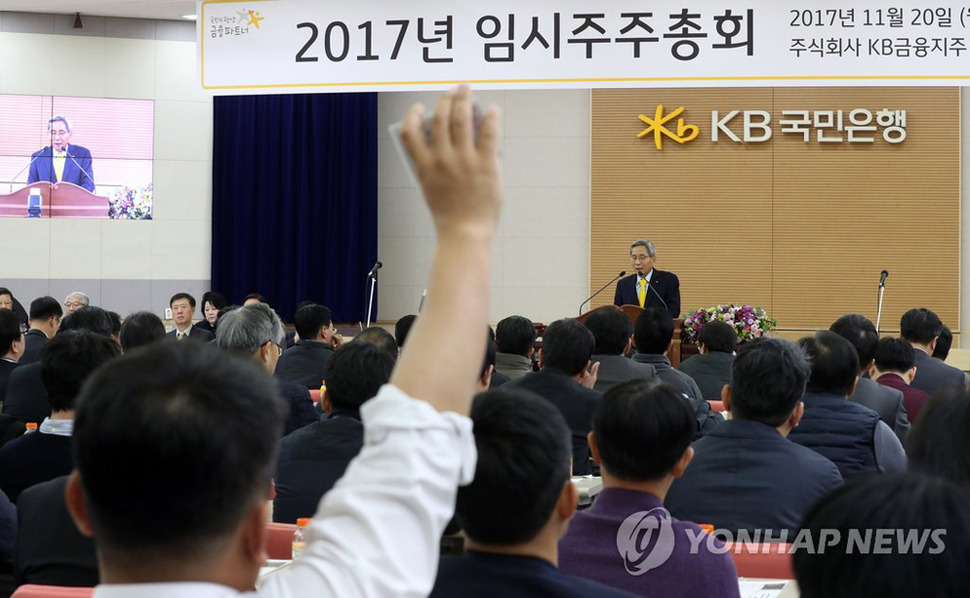 |
|
During a general meeting of KB Financial Group stockholders at the KB Bank headquarters in the Yeouido district of Seoul on Nov. 20, a representative of the labor union raises his hand to ask a question to CEO Yoon Jong-gyu.(Yonhap News)
|
Government has pledged to strengthen the voting rights of institutional investors
With South Korea’s National Pension Fund voting in favor of a measure proposed by the labor union to appoint outside directors during the general meeting of stockholders at the KB Financial Group, attention is turning to whether this will accelerate discussion of having worker representatives or their nominees on the board of directors. Representatives of the Pension Fund explained on Nov. 20 that they had voted in favor of the motion for outside directors recommended by the union to proactively exercise its voting rights as an institutional investor. The government of South Korean President Moon Jae-in has pledged to strengthen the “stewardship code” – that is, the guidelines related to institutional investors proactively exercising their voting rights. “If the stewardship code is put into place, the national pension fund will have no choice but to proactively exercise its voting right. Institutional investors will be urged to exercise their voting rights by deciding whether or not a motion contributes to long-term shareholder value,” said Ryu Yeong-jae, president of Sustinvest. Moon has committed himself to the labor director system, in which workers sit on the board of directors, both as one of his campaign pledges and as part of his governing agenda. “Implementation of the labor director system will begin with the public sector and with the four largest chaebols and will be expanded to other companies in the private sector. Enabling one or two worker representatives to sit on the board of directors will ensure that workers can participate in management,” Moon pledged. The Ministry of Strategy and Finance and the Ministry of the Interior and Safety have asked the Korea Development Institute and the Evaluation Institute of Regional Public Corporations to study plans for putting his pledge into practice. The new administration is planning to submit a related bill to the National Assembly as early as the first half of next year. A bill to revise the commercial code to require companies to appoint an outside director recommended by workers is already pending in the National Assembly, with sponsors on both sides of the aisle. Under the direction of Seoul mayor Park Won-soon, the city of Seoul is already implementing a labor director system for public enterprises under its control, and this system deserves attention since it basically serves as the Moon administration’s model. Under Seoul’s system, public enterprises with at least 100 workers are required to allow one or two worker representatives to sit on the board of directors. The system is currently in place at eight of the 16 enterprises where it is required, including Seoul Metro and the Seoul Agro-Fisheries and Food Corporation. The biggest objective of workers participating in management is resolving conflict between labor and management. “Considering the immense losses caused by social conflict, we need a new paradigm under which a cooperative, win-win relationship between labor and management can be regarded as a new engine for economic growth,” Park emphasized. According to the European Trade Union Institute in Belgium, 19 of the 31 countries in the EU have adopted programs for worker participation in management. Another objective is to monitor and to counter heavy-handed management practices by chaebol owners. This is similar to the goal of a revision to the commercial code submitted last year by Kim Jong-in, a former lawmaker with the Democratic Party, that would include one member recommended by a company’s employee stock ownership association to the outside director candidate recommendation committee. But the KB Financial Group union’s proposal was defeated in the general meeting of stockholders despite the support of the National Pension Fund. As that suggests, the opposition of the business community must be surmounted before the labor director system (or a system to appoint outside directors recommended by workers) can be implemented. In a document that the Korea Chamber of Commerce and Industry distributed to politicians in February expressing the business community’s view on the draft revision to the commercial code, the chamber aired concerns that making it mandatory for workers or figures they have recommended to be appointed as outside directors “could cause delays and distortions of decision-making if those directors prioritize the interests of workers and small-time stockholders over the development of the company.” While leading progressive groups acknowledge the need for worker participation in management in the long term, they are also cautious about the idea. Last year, Solidarity for Economic Reform basically opposed Kim Jong-in’s proposed revision to the commercial code: “A careful review is necessary because not all listed companies have an employee stock ownership association, and such associations could choose not to nominate a candidate for outside director.” The group’s director at the time was Kim Sang-jo, who is now head of South Korea’s Fair Trade Commission. This reflects a sense that the basis for cooperation between labor and management in South Korea is weaker than in countries like Germany where joint decision-making systems between the two sides are already codified in the law. “In Europe, auditing and management functions are performed by separate boards, but they are performed by the same board in South Korea. Given that situation, we need to think carefully before introducing a labor director system, since it could have side effects for decision making and management efficiency, in addition to its beneficial function of countering the major stockholders,” said Yun Seung-yeong, a law professor at the Hankuk University of Foreign Studies. By Kwak Jung-soo, business correspondent, and Park Su-ji, staff reporter Please direct questions or comments to [english@hani.co.kr]






